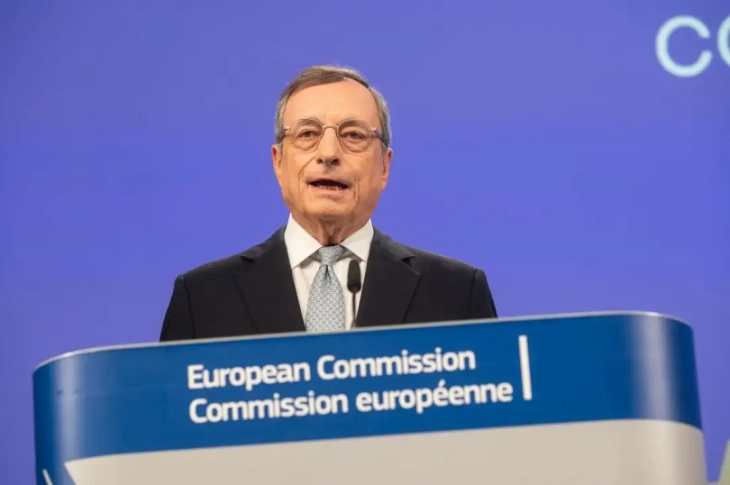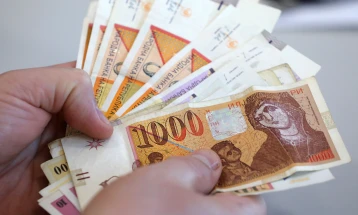EU must invest €800bn annually or face 'slow agony,' Draghi warns
- Former Italian prime minister Mario Draghi urged the European Union on Monday to develop "a new industrial strategy for Europe" to revive the bloc's flagging competitiveness versus China and the United States.

Brussels, 9 September 2024 (dpa/MIA) — Former Italian prime minister Mario Draghi urged the European Union on Monday to develop "a new industrial strategy for Europe" to revive the bloc's flagging competitiveness versus China and the United States.
At the heart of Draghi's much-anticipated economic report is an urgent call to action to address the EU's massive annual investment needs estimated at €750 billion to €800 billion ($829 billion to $850 billion).
"We have reached the point where, without action, we will have to either compromise our welfare, our environment or our freedom," he said in a Brussels press conference. "It's going to be a slow agony."
The report is to inform new strategy for economic competitiveness which is a priority for the next five-year term of European Commission President Ursula von der Leyen.
In his call for an economic makeover of the block, Draghi described the EU as being "stuck in a static industrial structure" compared to the United States and China. He focused on three areas.
Productive tech
First, the former president of the European Central Bank (ECB) wants the bloc to close its innovation gap with the United States, highlighting the major advantage Washington holds in the high-tech sector.
In the US economy, "most of the productivity is concentrated in the high-tech sector," Draghi said, noting that when tech is removed for comparison, the EU's economic productivity has performed better.
Draghi wants the EU to reduce regulations and ease compliance for tech entrepreneurs, especially smaller enterprises, as well as boost financing options for companies to expand.
Decarbonization versus growth
The EU must also use its status as a "world leader in clean technologies" like wind turbines to achieve new growth through policies to reduce carbon emissions, Draghi said.
He warned in his report, however, that if policy is not coordinated correctly, then "decarbonization could run contrary to competitiveness and growth."
The former Italian premier also warned of an overreliance on China and that "China’s state-sponsored competition" is also a threat to the EU's clean technology and automotive industries.
Draghi warned though that "black-and-white solutions are unlikely to be successful" for the EU when handling trade relations with China over clean energy technology.
According to Draghi, "emulating the US approach of systematically shutting out Chinese technology" would set back the EU's transition away from fossil fuels and impose higher costs on the economy.
The EU's high energy costs need to be addressed, Draghi stressed, and advocated for an energy market revamp to ensure that the price of more affordable renewable energy is no longer determined by costlier fossil fuels like natural gas.
Call for foreign economic policy
Drawing comparisons with the US and China, Draghi lastly called on the bloc to develop a "foreign economic policy" to craft more preferential trade agreements, build stockpiles of strategic raw materials, and secure supply chains of critical technologies.
More broadly, Draghi called for greater joint procurement in defence, easing competition rules in the telecoms market to allow more consolidation and deepening capital markets to boost investments.
"We should abandon the illusion that only procrastination can preserve consensus," he said in his report, stressing that how the EU makes decisions needs to change in a new era.
Draghi said the massive investment needs will need to come from public and private sources but that the "private sector is unlikely to be able to finance the lion's share of this investment."
To show the scale of the investment and challenge required, Draghi made reference to the US Marshall Plan to rebuild Europe after World War II.
Draghi said the equivalent of 4.4% to 4.7% of the EU's gross domestic product (GDP) in 2023 would be required - a ratio of investment to GDP not seen since the 1960s and 1970s.
"Mario Draghi's report is unambiguous," Neil Makaroff, a director with Strategic Perspectives, a European climate think tank said in a statement.
If the EU wants to reduce its dependence on China and catch up with the US then "27 different industrial strategies won't do the job," he said.
"Europe needs to get its act together with a robust and united industrial strategy that invests in cleantech factories and turns decarbonization into a competitive advantage.
This message must be heard from Berlin to Paris, Warsaw to Madrid," Makaroff added.







